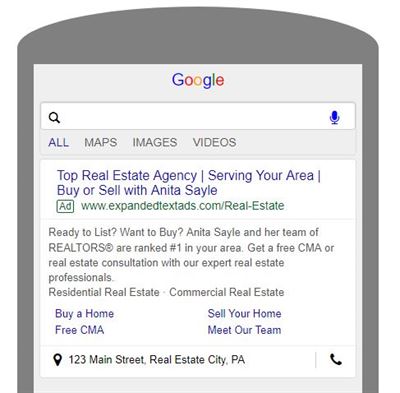Heat Level:
Bottom Line: Now that you've mastered the basics of SEO, you can move on to these more long-play techniques - but show Google the money and you'll skip the line.
Do This: Determine which keywords you can rank for, then...
 Three little letters - so much to do!You've accomplished the basic prerequisites of search engine optimization. You've made sure your site is registered with Google and you're getting good reviews. Now you're ready to move into the longer-play areas of Search Engine Optimization.
Three little letters - so much to do!You've accomplished the basic prerequisites of search engine optimization. You've made sure your site is registered with Google and you're getting good reviews. Now you're ready to move into the longer-play areas of Search Engine Optimization.
Keyword planning, content writing, and building backlinks are the advanced steps of SEO. It's an ongoing commitment, not a one-and-done checklist item. These three SEO techniques work together to give Google more to go off of when ranking your site. This is how you earn your way to the top.
But sometimes you just don't have time to do everything the organic way. That's why Google Ads exists. Just hang on for a moment while we talk through advanced organic SEO first.
You know as well as we do: real estate is competitive. You’re up against national chains, Zillow, Realtor.com, and local offices in your area. All of them want to show up first for “realtor” and “real estate agent.”
At this point in the game, Zillow and Realtor have most short-tail keywords (1-2 word search phrase) locked up. Instead of trying to enter the arena against these giants, you’ve got to find your own keyword niche. Short of hiring an SEO strategist, there are some free tools you can use to identify lower-competition keywords.
The first is Google itself. Run different searches and see what comes up. For example, a zillion competitors are already vying for first on “Pittsburgh real estate,” but “Dormont real estate” comes up pretty dry. It's less competitive, and a better place to start.
The second is Keyword Tool. Drop in a search term and it'll tell you what you're up against. I like this tool because it gives me context for how popular and competitive certain keywords are. Ideal keywords are high search volume, low competition - although that's kind of like looking for a unicorn. Keyword Tool is a paid service but you can get limited results as free user.
Another tool to try is the Keyword Planner in Google Ads. This is especially useful if you're actually planning to run a Google Ads campaign (more on that in a minute). Keyword Planner helps you find new keywords and get search volume forecasts. You must have a Google Ads account to use this free tool.
Using the tools above, identify 1-2 keywords you want to focus on. Long-tail keywords (phrases with 3-4 words) are the foundation for getting your website recognized and ranked with Google. Once Google realizes that you have authority for your long-tail keywords you’ll start to see more traffic overall.
Brainstorm as many content topics as possible around your focus keyword(s). Here's an example:
Keyword: Dormont Real Estate
Content topics:
Next, start drafting new content pages and blog entries around these topics that support your focus keyword(s). Write naturally, but make sure your keywords make their way into your page titles, H1s, and the content itself.
Keep in mind that you're striving for good copywriting, not keyword stuffing. Your website content writing has to serve SEO purposes, but it should be written for human readers first and foremost. If it feels forced, don't write it.
Next, you've got to work it. Drive people to your content - Google won't do that for you. We're talking social media, email blasts, links on print material, verbally telling people where they can find your website, info sheets at open-houses with a QR code to the property's URL on your website... You've got to start by generating your own traffic to this killer content you've been working on!
Backlinks are hyperlinks from other websites. Google places value in them because it’s their way of asking for a reference. If other high quality sites link to your site, Google trusts you more.
Look for opportunities to get high-quality backlinks (not from spammy directory sites). Here are some ideas for how to get them:
Ask the vendors you work with.
Ask about opportunities with your local Chamber of Commerce, township, etc.
Work with a local charity and ask for a “Sponsored by” backlink on their website.
Answer HARO (Help a Reporter Out) questions.
Sponsor a club or event at a local school and ask for a backlink in return.
Offer to review a service or technology you use in exchange for a backlink.
Make sure your business is listed with its URL on high-quality directory sites like Yelp, Manta, Yellowpages, etc. (We sometimes use Moz to help automate updating these listings).
 Whether you're doing the advanced SEO work, or just want to skip ahead, paid search ads might be a helpful shortcut.
Whether you're doing the advanced SEO work, or just want to skip ahead, paid search ads might be a helpful shortcut.
Google Ads are a way to jump the line and get yourself to the top of search results for a chosen keyword. When users search for certain keywords you’ve listed, your ad will appear in the search results. Depending on how good of a match your ad is (and how much you’re willing to pay), your ad may appear at the very top of the first page, near the bottom of the first page, or on subsequent pages. It will have a little green “Ad” tag next to it.
Here's what we like about paid search:
Google Ads can be extremely effective. We run Ads accounts for many clients because it helps them compete with bigger firms for competitive keywords, which they might never show up for otherwise. Bing also has Ads, which are often less competitive (we will compare the two platforms in a future post).
Yes, you absolutely can. And you should. Google Ads uses many of the same ranking factors that it uses for organic search, like keyword relevance and website quality. If you're already writing good quality, interesting content and keeping your website technology up-to-date, Google will take that into account with your ad quality score.
Organic SEO requires a long-term commitment to your website's content and tech. You can't simply say "I want to be first" without knowing where you want to be first or how you'll earn your way to the top. Know that there are some SEO factors that are simply outside of your control. Your domain name age, for example, can't be changed, unless you can time-travel and buy your domain ten years earlier.
For the same reason you tell sellers to spruce up their home before listing, you should make sure your site is in top shape before investing in ads. But if you've done the pre-work and need a boost, Google Ads are worth consideration. Stay tuned for more on Google Ads (or drop us a question in the meantime).